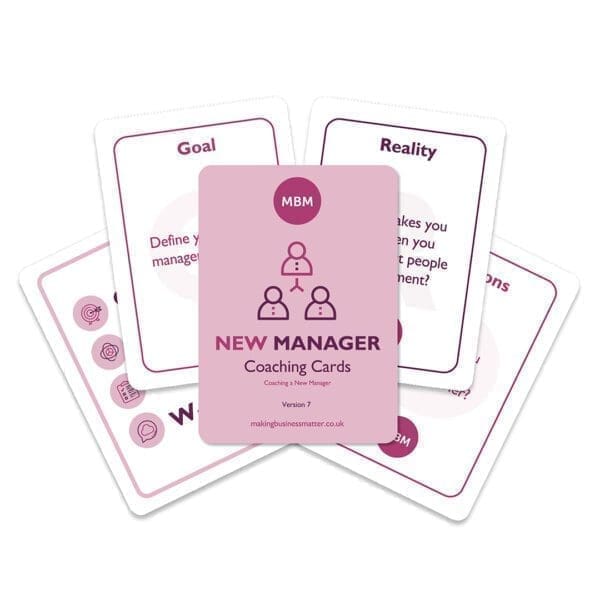Are You Currently Meeting the Development Needs of Your Leaders?
Many companies, even today, overlook the importance of training for managers in their organisations. This can lead to many different problems for everyone concerned.
In this article, we will look at what needs you may have when considering training for managers. Next, we will look at the different approaches available. Also, we will show the benefits and pitfalls that occur as a result of (or lack of) investment in this area. Finally, we will cover 6 important steps to take when looking at selecting the right training for managers in your organisation.
Having worked in the world of learning and development for years, I can say from first-hand experience that a lack of training for managers in the team causes all levels of problems throughout the ranks. We will share with you how overlooking these development areas can have lasting effects on your organisation. Usually, these effects are negative but avoidable.
Topics When Planning Training for Managers

There are lots of skills and knowledge that managers and team leaders in your company need. It’s important to know what some of the essential topics are. Here, we will review some of the key areas of development. However, this is not an exhaustive list. Add more of your own choosing, based on your needs. Let’s take a look at the following 8 important areas.
- Communication Skills
- Emotional Intelligence
- Managing Staff Performance and Development
- Handling Conflict
- Time Management
- Reward and Recognition Programmes
- Public Speaking Skills
- Decision-making and Problem-solving Skills
#1: Communication Skills
First, think about the last team meeting you led. How were your messages received? Would you change your approach in any way to make the communication more effective?
Often, we expect that leaders already have the necessary skills available to do the job and get results. This can be a dangerous assumption to make. Instead, we need to check these skills before hiring or promoting people to leadership positions.
One basic area of focus when planning training for managers is communication skills. This can be written as well as spoken skills. Consider the following steps to address this developmental need.
- Attend a team meeting to see how the leaders interact with the team. Do they speak with them or at them? Is the conversation 2-way?
- Monitor how the leaders interact with one another. The communication skills they show should be reflective of the respect they have for their peers and colleagues.
- See how they communicate with your customers. If they are writing to the customer, ask to be copied in every now and then to check their tone and level of professionalism. The same can be done with suppliers and business partners.
- Listen to how they communicate negative or difficult news. This can be with staff, colleagues, or customers.
All of these activities will give you a much better understanding of the communication styles and skills of your leaders. As a result, you will be in a much better position when planning your training for managers in the team.
>> Review our Communication Skills Training
#2: Emotional Intelligence
This is a big topic all on its own. However, it is essential to address when considering training for managers in your company. Not only does it bring the human element of the company to the forefront, but it also brings better awareness to the managers of their actions and consequences.
We have a great article here on MBM about emotional intelligence (EI), please have a look for more detailed information on the topic. For now, let’s have a look at some of the basics that this topic brings to any leader.
We know that EI covers 5 important elements:
- Self-Awareness: understand your own emotions, be aware of what your triggers are, and how your words and actions impact those around you.
- Self-Regulation: understand how to control your emotional responses in different situations.
- Motivation: stay passionate and goal-focused without the need for reward or recognition.
- Empathy: can understand the feelings and perspectives of others, enabling you to make better decisions.
- Social Skills: can build relationships, interact well with others and create team unity.
Any programme that looks at training for managers should include this topic, even the basics. Emotional Intelligence brings with it many great skills that leaders require to get results.
Sticky Learning ® is 7 times more effective than 1-day training courses. Plus, you will get a Chain of Evidence proving your Return on Investment. Discover soft skills training that changes behaviours long term.

#3: Managing Performance and Development
All great leaders focus on their team. This includes having the skills to manage their performance and development along the way. As such, it is a great idea to include this in any programme about training for managers. But, what does that actually include?
Performance Management
First, train your team leaders on how to conduct formal and informal performance reviews. From experience, I can say that one of the best approaches is to have a new leader sit in on a few reviews to see how they are handled.
Next, allow the new leader to take the lead while being observed. Your feedback will be a great roadmap for them. Always include both positive and constructive feedback for better results.
Then, get feedback from the team to see how they felt the sessions were.
Finally, encourage informal chats to happen regularly. This will avoid all the feedback being given in only formal settings. Get them to discuss performance over a coffee, or even a short lunch together.
Development Management
Leaders need to be able to cover 2 areas of development: managing the development of others and self-development.
Here, we see effective leaders leading by example by showing the team that there are different opportunities to learn and grow. Also, when we manage others we need to be able to see their future potential.
Personal development plans are a great tool to use to show commitment in terms of development. There are clear goals, timeframes and structure. Everyone involved knows what to expect. Therefore, the results tend to be more effective. Also, proper follow-up is easier.
As a topic for others to learn how to manage, remind those involved of when their leaders gave them opportunities to grow and develop. Where would any leader be without those chances?

>> New manager coaching cards <<
>> Access on Amazon <<
#4: Handling Conflict
Conflict happens. It’s a fact of life. Therefore, it’s important that leaders know how to handle conflict effectively. Otherwise, it can simply dominate the whole team when it goes unchecked.
Any training for managers needs to address conflict and the potential barriers it can create. Also, we need to address the different ways to manage conflict to get the right results. One model I would personally suggest covering is the model by Thomas Kilmann. Here, he addresses 5 common approaches to conflict management, their benefits and disadvantages. I have used it many times in the past and can vouch for its usefulness. Give it a try.
>> Review our Conflict Management training
#5: Time Management
No training for managers is complete without looking into the skills needed for effective time management. Some argue that you can’t actually manage time. However, I would argue that all leaders need to know some of the common time management practices. Here, I would recommend that you look at the 4 D’s:
- Do: avoid delaying these tasks either due to urgency or timeframes.
- Defer: postpone these tasks to another time in your calendar, however, don’t ignore them for too long.
- Delegate: understand what tasks you can hand off to others in the team to cover.
- Drop: get rid of these time-wasting tasks that don’t provide any substance to your goals and objectives.
These are best reflected in the Urgent/Important matrix which is a great tool to train your managers to know and use. In addition to the matrix, ensure the topic covers how to delegate effectively.
Other time management models worth taking a look at and adding to the programme include the Pomodoro technique and the Pareto principle.
>> Review our Time Management training (Very popular)
#6: Reward and Recognition Programmes
Not everyone is motivated in the same way. Therefore, it’s important that your leaders are properly trained on how to create and organise effective reward and recognition programmes. In addition to the development plans, we spoke about earlier, it is recommended that leaders know the different approaches to take. This isn’t always as easy as it sounds.
Again, I am speaking from experience. In one company I worked for, we included a section in the employee satisfaction survey. It didn’t quite go according to plan. Across every department, there were so many suggestions on what should be included in our reward programme. Of course, many of them were completely unrealistic. Then, when the revised programme was launched, many of the staff questioned why their ideas hadn’t been considered. We made the mistake of leaving the option too open for suggestions. The programme was set to fail from the start.
Therefore, train your managers on how to approach this type of programme effectively. Avoid only looking at monetary rewards. Instead, branch out to other areas of recognition, such as customer experiences, product rewards, or development opportunities.
#7: Public Speaking Skills
Some people really struggle with having to speak in front of others. It’s very common and also quite natural. However, many leaders need to have the skills to speak and present in front of small or large groups. This can be VERY intimidating for many people who are new to that type of responsibility.
Prepare your team effectively. Include this topic to allow them to succeed when addressing a group. Encourage them to practice with topics they are experts in. That way, they will be more confident. Also, give them chances to practice.
Any training for managers on the topic of public speaking should include:
- Clear articulation
- Using visual aides
- Appropriate body language
- Connection with the audience
- Having a clear message
- Ability to answer questions
Practice before any public speaking session is an effective way to succeed. However, offer coaching from more experienced public speakers in your team as one way of helping. Also, encourage and support nervous leaders before speaking events.
#8: Decision-making and Problem-Solving Skills
These important leadership skills don’t simply develop overnight. In fact, many leaders continue to struggle with these skills without the proper guidance and training. Therefore, include these in any programme you have planned.
These skills, when developed properly, can:
- Create better teamwork and collaboration
- Improve customer and staff complaint resolution
- Increase team productivity
- Build trust within the team
- Reduce conflict and frustration
As you can see, these skills need the right attention in order to achieve these benefits and more. Therefore, be sure to include them in your training for managers programme.
Approaches to Training for Managers

So, we have looked at some of the important topics to include in any programme you are planning for training. Now, let’s see what delivery styles we might adopt to make it happen. We will be looking at:
- 1-1 coaching
- Team training
- On-the-job training
- Online training
All of these options come with their advantages. Here are reasons for using the different approaches.
1: 1-1 Coaching
This can be an effective way to address training needs to individuals rather than teams. Here, we can really concentrate on the needs of the person and their developmental requirements.
2: Team Training
Here, we see the training happening for a group. There is increased interaction and participation with the group working together through the topic. This can be used for soft or technical skills.
3: On-the-job Training
Usually, we use this approach for technical or experience training needs. For example, you can train an individual or a team on a particular process or procedure, getting them to practice on the job as they are learning. This hands-on approach can be great to show the team members how the task is completed.
4: Online Training
This approach isn’t for everyone. Some people just aren’t that confident with technology. However, with online training, you have a number of advantages. You can train from anywhere as long as you’re online. Also, many tend to be self-paced, which means people can dip in and out of their course. Additionally, there is such a wide range of choices online nowadays, making it easier to find the topic and service that best suits your needs.
Benefits and Limitations to Training for Managers
In this section, let’s have a look at the advantages and disadvantages of setting up any training for managers in your company.
Benefits:
There are so many reasons to invest in the training. Here are some:
- Increased confidence.
- Better communication.
- Improved leadership and employee morale.
- Enhanced ability to adapt to change.
- Boost in productivity.
Limitations:
There are, however, some barriers to be aware of. These are:
- Some companies simply don’t have the finances to invest in long-term programmes.
- Leaders may just complete the training to give them a competitive edge in the job market.
- Different people learn in different ways, therefore, it’s not a one-size-fits-all option.
- It does take time away from work, and not every team can afford that.
Keep in mind that the benefits will always outweigh the limitations. Therefore, just be aware of the possible barriers so you can find ways around them.
6 Steps for Success

Here, I want to share my experience as a Learning and Development manager as well as department head to share 6 key steps you need to follow to get the best results.
#1: Train Before Promotion
From experience, I have seen the difference this makes when training for leadership positions. It can be the key element between success and failure. You may not decide to put them on a structured classroom training first. However, at least prepare them for the role with some coaching and on-the-job training before throwing them in at the deep end.
#2: Have Clear Objectives
Know what you want to achieve as a result of any training. No matter how long or short the training will be, there needs to be clear objectives. Without these goals in mind, buy-in for the training may be missing. Share your reasons and expectations in terms of the needs and outcomes. That way you should get much better results.
#3: Communicate Before It Starts
While discussing the goals and objectives, have a conversation about the training itself. Prepare the staff for what they should expect. We spoke about using personal development plans earlier in the article. By doing so, you have the perfect opportunity to communicate everything about the upcoming training. You also create the chance for everyone involved to commit to the time and effort required for it all to happen.
#4: Provide Opportunities to Practice
We remember best when we use what we learn. Whether these are technical skills, knowledge or soft skills, it all counts. Therefore, provide anyone involved in training the chance to put everything into practice. Otherwise, they will simply forget they were taught and the time and effort will be wasted. When planning training for managers, create occasions for them to use their newly developed skills, under supervision at first if required.
#5: Select Your Approach Carefully
As mentioned, people learn in different ways and at different paces. Therefore, consider this when selecting the approach that best suits your needs. From my experience, have a blend of different approaches. That way, they get the theory and practice.
#6: Support and Encourage
Finally, you need to drive the learning and development opportunities that you offer. There are a number of considerations to keep in mind.
First, communicate positively about the training. If you come across as unwilling or reluctant to have the training happen, your team will follow likwise. So be the voice of reassurance about the benefits of the training.
Next, look in on the training. See first-hand how the training is progressing. That way you will better understand what is being covered and how it can be improved if needed. Also, you will show your support for the time invested by being there as well, from time to time.
Also, catch up with the participants on a regular basis throughout the process. Find out from them how they are finding the training. Again, this shows your support for the efforts and commitment to the training plan.
Finally, lead by example by attending or completing training yourself. In this way, you are showing your belief in the importance of ongoing development.
Wrap Up
Well, there you have it. Your essential guide to training for managers. I hope you can take away some useful points and suggestions and put them to good use for you and your team. Remember, training for managers brings great rewards and results for everyone involved when handled right. Good luck!




